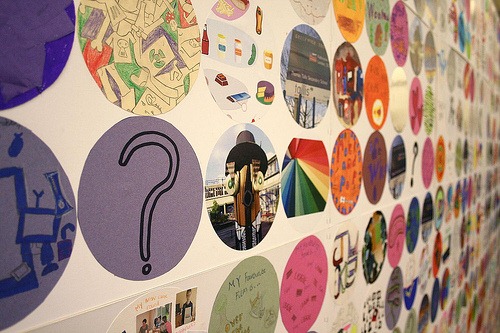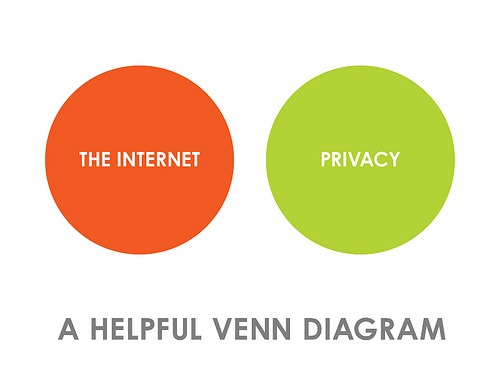Posts tagged online identity

#15MINPLN No. 3 – Deciding Who You Are (Online)
Nov 14th
Image: Some rights reserved by fotologic
Short version:
Work out what you want to share about yourself when you develop your PLN.
Long version:
(See the first #15MINPLN post to understand what this series is about).
This should be a quick activity, but could potentially take you the longest.
If you’ve followed step 2 – breathe in, breathe out, you have already thought about what your interests are online, and these should form the basis of who you are within your PLN (Personal Learning Community).
There are a number of questions which all stem from one central question – how much of the real you do you want to share online in your PLN (bearing in mind that what you share for like-minded educators around the world will be equally accessible for anyone; teacher, parent, student or otherwise).
There is a lot of important discussion and debate about protecting your online identity. Much of that focuses on how to ensure that aspects of someone’s life are not made public to the world online – avoiding any negative, privacy-invading identity issues.
Putting your information online can be an intimidating idea to many at first. But I think it is good to think of it this way – in this regard, you are the editor of what goes online, and you are actively creating a positive online presence (the healthy flipside of avoiding a negative online presence).
Building a PLN necessitates deliberately putting information about you online, and while it might be tempting to hold back on details, if you are going to join the conversation with other educators they will probably want to be convinced that you are the real deal.
Image: Some rights reserved by waldopepper
This comes down to a question of how you draw the line between your professional life, and your ‘everyday’ life – I am not calling it a private life, because if something is deemed by you to be private, then you have already made the decision about that particular thing. I am talking about the aspects of your life beyond your workplace that you might consider sharing as part of your overall identity. Are you happy to share with others details of your interests, home, family, tastes in music and TV, holiday destinations, etc. You should probably make that decision now. It is up to you. Plenty of educators with established PLNs do share everyday stuff – their progress with training for a marathon, their advice to their parents on whether to buy an iphone, their holiday plans. This sort of detail can help other folk connect with you more readily – to know that you are human. While ‘The Conversation’ is largely focused on professional ideas, it should be no surprise that a sizeable chunk of tweets on twitter by educators are personal references, sharing the whims, trials and tribulations of their everyday lives.
As above, and this is hopefully an obvious point, anything you consider private should stay offline. This diagram helps us to remember this:
Image: Some rights reserved by Dave Makes
So the point, again, is to have a think now about how you will project yourself. Here are some smaller questions to get started with:
- What are your interests? How can you be succinct about these? As a guideline: when you set up a twitter account, you get to write a bio in 160 characters or less – this is a good way of editing to the most important aspects of your professional life. And will you include everyday info here too? Try it.
- What will be your ‘avatar’ image? An icon? A picture of you? Choosing a picture you are happy with is the one thing that could take you the longest here …
- Will you state where you work? Your position? How will that reflect on where you work? What might your colleagues / managers think of this association?
- Where you live?
- Will you make references to family? Chances are that some of the social networking tools you will be using will at some point involve invitations from / to family members and friends – is this OK with you?
- Will you reference previous employment?
- Do you want some kind of ‘tagline’? – a sentence that describes what you are about? This might be handy when creating a profile on some of the web tools discussed in later #15MINPLN posts – blogs, for example, often carry a tagline.

#15MINPLN No. 2 – Breathe in, Breathe Out
Nov 14th
Short version:
Decide what aspects of education you want to specialise in when sharing ideas, tips, and resources with other educators on the Internet.
Long version:
(See the first #15MINPLN post to understand what this series is about).
‘Breathe in, breathe out’ is a metaphor to describe the importance of sharing: putting out useful information, resources and ideas that you have come across and /or developed. For too long as a teacher, I think I have been breathing in (syphoning and hoarding stuff primarily from the Internet that has quickly piled up into gigabytes upon gigabytes of data and fleeting ideas that I can’t easily locate or remember). That’s breathing in and holding your breath for too long.
Image: By Alan Vernon. Some rights reserved
We need to breathe out. Try to give back to other teachers and educators almost as much as we take in.
Focused breathing
What do you want to know about? There’s a lot to breathe in, but you’d be better off deciding where you want your focus to be. 15 minutes a day, is only a guideline, but it reflects the fact that we as teachers are very busy. Always will be. When you open the pipe, there is a potential deluge of information which will leave you dazed, directionless and ultimately washed out. The sheer volume of information that can accessed be reminds me of a TV advert in the UK a few years back when British Telecom were announcing the arrival of broadband. Some workmen accidentally break open the broadband ‘pipe’ and unleash an uncontrollable torrent of digital wonders. One of the workmen manages to order it all back where it came from, and you might just need to be prepared to do the same with the ocean of information out there.
The simplest way to pack it all back in the pipe after 15 minutes is to limit what you are unleashing in the first place.
Decide now what you are interested in finding out about relevant to your role as an educator. You could type up a list somewhere, one which you can come back to and edit from time to time. Ideally, you’ll be coming back to this list soon if you follow these 15 steps.
This list is ultimately a way of you drawing up a rough map of the things you want to gain your professional development in.
Your list of areas of interest might overlap and that’s absolutely fine.
Here are some ideas:
Subjects / Disciplines / Curricular Areas you are interested in. For me, currently, that could primarily be Geography, Economics and Theory Of Knowledge.
General interests in education. For me that would be things like educational technology (edtech), student voice, leadership, the very broad notion of twenty first century education, intercultural education, and self-led professional development.
Specific interests linked to the above: e.g. for me, a few examples include: use of Google Apps in the classroom, use of Infographics in learning and ways of disseminating (edtech) initiatives within a school.
Breathe Out
Image: Some rights reserved by Thowra_uk
And how can you breathe out?
List the aspects of your role as an educator which you could share with a highly-connected international community of like-minded educators. This could be something you consider yourself to know quite a bit about and already have resources, tips, methods, thoughts to share on. Or, it could be something you want to gradually become more proficient at, and are prepared to share what you are learning as you do so. For example, I am learning about developing a Personal Learning Network (PLN) and as I do so, I am sharing it here.
Add this to your list. There’s bound to be overlap (there maybe complete overlap) with the ‘breathe in’ list. And that is just as we might expect.
Next #15MINPLN post: ‘Decide Who You Are (Online)’







